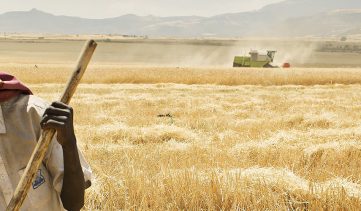Ethiopia, August 18, 2021
Co-Organized by: the National Information Platform for Nutrition (NIPN), the Ethiopian Public Health Institute (EPHI), the International Food Policy Research Institute (IFPRI)’s Ethiopia Strategy Support Program (ESSP) and CGIAR Research Program on Policies, Institutions, and Markets (PIM)
Introduction:
- Dr. Aregash Samuel, Researcher in EPHI's Food Science and Nutrition Research Directorate and the National Coordinator for the NIPN in Ethiopia
Moderator:
- Cornelia van Zyl, Senior Technical and Policy Advisor in IFPRI
Presenters:
- Dr. Bart Minten, Senior Research Fellow in IFPRI's Development Strategy and Governance Division
- Dr. Fantu Nisrane Bachwe, Research Coordinator in IFPRI's ESSP
What are the trends in price variations of fruits and vegetables in Ethiopia? And what are the implications on people’s diets? What is the current situation in Ethiopia as it relates to emerging medium‑scale tenant farming and the COVID‑19 disruption?
These questions are cardinal given the importance of prices for consumption decisions for important nutritious crops.
The first speaker, Dr Fantu Bachewe, discussed findings from large-scale retail and producer price datasets, and price behavior of fruits and vegetables in Ethiopia over the last 15 years (2005 - 2019). The analysis noted that prices for fruits and vegetables rapidly increased compared to cereals and were more expensive than 15 years ago. Price rises were due to increased marketing margins and significant seasonality in vegetable prices. In addition, there was significant spatial price variation in the country.
The second speaker, Dr Bart Minten, shared findings from a study on the rapid expansion of intensive vegetable cultivation in the central Rift Valley in Ethiopia. Almost 60% of the irrigated area is cultivated by medium-scale tenant farmers relying on short-term rental contracts. These gig economies, characterized by flexible contract arrangements implemented by outside contractors and which are fueling sophisticated sectors in developed countries, are also important in commercial agrarian settings in Ethiopia. For instance, the commercial vegetable cluster in the central Rift Valley in Ethiopia is worth $200 million per year, which is close to the value of the much-heralded flower exports from Ethiopia.
Both speakers emphasized the policy implications on both these studies and made strong and candid policy recommendations for Ethiopia (please click HERE to access the webinar presentations).
These timely and interesting presentations were followed by a lively question and answer session (please click HERE to see the summary of Q&A).
The webinar brought together 86 participants from different sectors, including policymakers, academia, researchers, development partners and NGOs, and discussed the evidence and program implications for Ethiopia.
The NIPN is a multisectoral initiative supported by the European Union, the Bill and Melinda Gates Foundation and the Foreign, Commonwealth and Development Office. The NIPN in Ethiopia is housed at EPHI, receives technical assistance from IFPRI under its Compact2025 initiative. The NIPN promotes evidence-based decision making for nutrition and supports the implementation of the National Food and Nutrition Policy.


